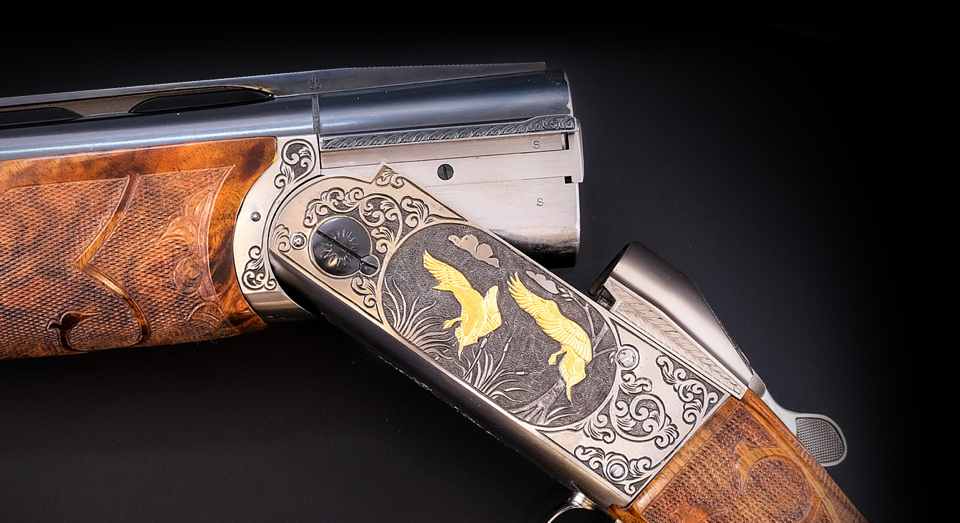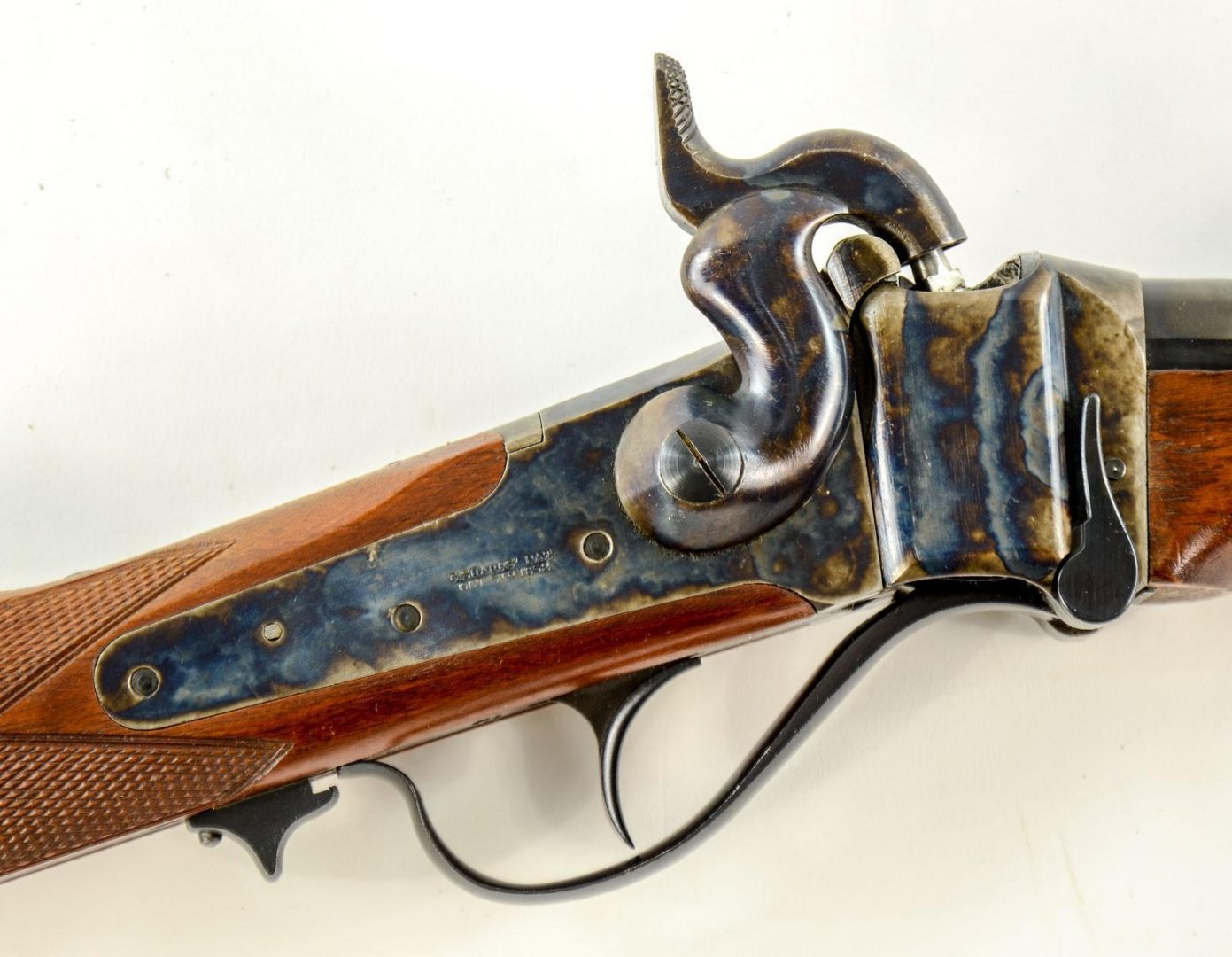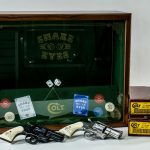Making important decisions about your gun collection. Get advice about how to transfer or sell antique and modern guns in Connecticut.
If you collect Rifles, Pistols, Shotguns or revolvers, it’s important to make good decisions about your family or estate gun collection.
Whether you’re a hunter, target shooter, tactical enthusiast, or just a proud collector, chances are you have put together a valuable collection of firearms. Maybe even an investment grade portfolio to pass on to future generations.
There’s that .45 semi-automatic 1911 that grandpa used in the World War II, a couple of deer rifles, a .12-gauge shotgun for sporting clays, an elephant gun you got for that African safari back in the ’90s, the AR you bought long before the state outlawed them, and at least a dozen more rifles and pistols.
Now that you’re getting older, you’d like to bequeath your collection to a family member, maybe to a longtime hunting companion or to your children, who have been shooting guns since they were able to square off on the sights and are enthusiasts themselves.
So you draw up a will stating which guns go to which relatives and assume that your executor or trustee will deliver them after your death, right?
Wrong.
No topic is more politically polarizing or inspires more passionate debate than government regulation of the transfer of firearms. We’ve all heard the rhetoric: “You’ll have to pry this gun from my cold, dead hands.” “Guns do not kill people; people kill people.” “The only thing that stops a bad guy with a gun is a good guy with a gun.”
Tragedies like the 2012 Sandy Hook school shootings and other mass shootings in the U.S. have only intensified the debate.
Very few states have clamped down on firearm transfers harder than Connecticut. So restrictive are its regulations, in fact, that some of our clients have considered moving themselves (or the firearms) out of state to avoid these complications.
The issue is especially relevant here in the Northeast. Most of our buyers plan for their transfer via wills or trusts. Because of the complexity and importance of complying with transfer laws – and the severe consequences of failing to do so – executors and trustees charged with handling the estates of gun owners must have a solid understanding of Connecticut’s regulations.
These regulations vary not only by what weapon is to be inherited, but by who is in line to receive them.
Assault weapons, for instance, are for all practical purposes non transferable under Connecticut law. With only a few exceptions, Bequest through a will is one of the few… assuming it was registered. Don’t forget that the recipients of the inheritance have to be eligible, and stay eligible through the estate proceedings in order to receive them.
First, let’s look at the firearms to be transferred.
Heavily restricted firearms
“Heavily restricted” is not a term found in Connecticut or federal law, but it describes a range of firearms that are severely regulated by both.
Included are assault weapons (among them, the AK-47 and Thompson “Tommy” gun) named in Connecticut General Statute. Also Heavily restricted are class 3 registered machine guns, sawed-off shotguns and other weaponry listed in the National Firearms Act of 1934 – which was federally passed at the height of gang activity lead by men like Al Capone.
You can theoretically take possession of such firearms with a Pistol Permit issued by the Connecticut DESPP and after the Probate court has signed off on the issue. But in reality, this almost never happens. It is thus clear that Connecticut is intent on eliminating severely restricted weapons by making their in state transfer almost impossible.
- Removed from Connecticut
- Sold to a federally licensed firearms dealer
- Destroyed
- Turned over to law enforcement
The above, thanks to legislation that went into effect recently, now also applies to magazines holding more than 10 rounds, unless the owner registered their possession before the year 2014. Violators face a Class D Felony if they were not.
So how serious is Connecticut about eliminating these weapons through attrition?
Transfer of assault weapons can create felony liability. Mere possession of a restricted firearm registered to someone else can lead to a felony or misdemeanor charge.
Yes, executors of wills and administrators of estates appear to be protected from prosecution, especially when ensuring the transfer of firearms within the confines of an estate plan. But the law does not extend to their designees or other family members.
Less restricted firearms
The vast majority of weapons owned and used in Connecticut and throughout the nation fall into this category. Included are hunting rifles, shotguns, revolvers and semi-automatic pistols bought for personal or home protection.
But does this mean their transfer is simple? Not even close.
The safest and simplest way to transfer any firearm from one person to another, even in distribution of an estate, is through a Federal Firearms Licensee (FFL) who also has the necessary Connecticut licenses to deal in firearms.
Not only do such dealers know firearms, but they can carry out required background checks on intended recipients.
‘Wallet gun’ owned by a collector
“Antique” is defined by Connecticut and Federal law as firearms and ammunition for those firearms manufactured prior to 1899.
“Curios or relics” are defined as:
- Firearms of “special interest to collectors by reason of some quality other than is associated with firearms intended for sporting use or as offensive or defensive weapons.” Such weapons must be at least 50 years old.
- Weapons certified by the curator of a government-owned museum to be “curios or relics of interest.”
- Any other firearms which derive substantial monetary value from being novel, rare or bizarre, or by association with some historical figure, period or event.
Yes, antiques, and some curios and relics can legally be transferred without going through an FFL, but before doing so I recommend consulting the Bureau of Alcohol, Tobacco, Firearms and Explosives guide to firearms meeting the legal definitions (online at atf.gov). A qualified FFL should verify a firearm’s classification before transfer.
And since January of 2014, transfer of curios and relics can’t be made unless the recipient has both a Connecticut Firearms (pistol, long gun, etc) Permit and a Federal Curio or Relics type 3 license.
Bottom line: Going through an FFL, exemptions notwithstanding, is the safest and simplest way to transfer ownership and comply with federal firearm license regulations.
After reading all this, you may wonder about the real risk of noncompliance.
Are the police really hell-bent on arresting offenders of the gun transfer laws? Are they going to kick your door down, put you into the back of a squad car and drag you to jail in the middle of the night for transferring guns to our family members after a loved one’s death?
Of course not. But what if? What if an illegally transferred gun is used in a crime? What if such a gun is used by a family member or friend to commit suicide? This is, of course, when it can get dicey, and the issue becomes all too real for the executor entrusted with a gun’s transfer, highlighting the importance of a gun trust or explicit estate plan guidelines.
Call us today
And ask about how to consign your firearms to auction. We offer free appraisals and auction estimates by appointment.
FAQ's
What happens to my guns when I die?
When you pass away, your firearms are typically included as part of your estate. They can be transferred to your heirs according to your estate plan.
How can I transfer firearms from a deceased loved one?
To transfer firearms from a deceased person, you may need to go through a legal process depending on state laws. It is advisable to consult with a licensed gun dealer for guidance.
What is the best way to transfer gun ownership?
The best way to transfer gun ownership is through a gun trust, which can help ensure a smooth and legal transfer of firearms to the intended recipients.
Can I legally possess my deceased loved one's firearms?
In order to legally possess your loved one’s firearms, you may need to follow specific procedures outlined by state laws and possibly involve a licensed gun dealer in the process.
How can I securely take possession of the guns I inherited?
It is important to ensure that you secure the firearms you inherited properly, especially if they are subject to state laws regarding gun ownership and possession.
Can I transfer a firearm across state lines?
Transferring a firearm across state lines can be complex and subject to both federal and state regulations. Consulting with a licensed gun dealer is recommended to ensure compliance.
What are the key considerations when transferring gun ownership?
When transferring gun ownership, it is important to consider state laws, regulations on possession of firearms, and the requirements for legally transferring a firearm.
We need guns
Get Top Dollar For Your Collection

Modern firearms, antiques, collectibles… We sell it all. Not sure what your collection is worth? Let us help!
Get A Free AssessmentDon't miss out
Join Our Mailing List
Don’t miss out on rare finds and great deals! Sign up for our mailing list and we’ll let you know what we have coming up for auction!
Guns Wanted!
Have one to sell?
Contact us today for a free evaluation of your firearms, military and weapons. We are happy to show you how to sell your gun collection at auction. We can also make a fair and immediate offer for outright purchase.

